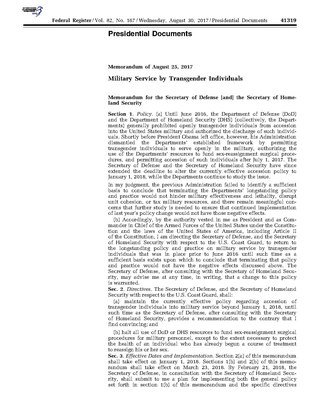
In the United States, an executive order is a directive by the president of the United States that manages operations of the federal government. The legal or constitutional basis for executive orders has multiple sources. Article Two of the United States Constitution gives presidents broad executive and enforcement authority to use their discretion to determine how to enforce the law or to otherwise manage the resources and staff of the federal government's executive branch. The ability to make such orders is also based on expressed or implied Acts of Congress that delegate to the president some degree of discretionary power. The vast majority of executive orders are proposed by federal agencies before being issued by the president.

Executive Order 11246 was an executive order of the Article II branch of the U.S. Federal government, in place from 1965 to 2025, specifying non-discriminatory practices and affirmative action in federal government hiring and employment.

The under secretary of defense for personnel and readiness, or USD (P&R) is a high-ranking civilian position in the Office of the Secretary of Defense (OSD) within the United States Department of Defense responsible for advising the secretary and deputy secretary of defense on recruitment, career development, pay and benefits, and oversight of the state of military readiness. The under secretary is appointed from civilian life by the president and confirmed by the Senate to serve at the pleasure of the President.
Title IX of the United States Education Amendments of 1972 prohibits discrimination "on the basis of sex" in educational programs and activities that receive financial assistance from the federal government. The Obama administration interpreted Title IX to cover discrimination on the basis of assigned sex, gender identity, and transgender status. The Trump administration determined that the question of access to sex-segregated facilities should be left to the states and local school districts to decide. The validity of the executive's position is being tested in the federal courts.

Executive Order 13769 was signed by U.S. President Donald Trump on January 27, 2017, and quickly became the subject of legal challenges in the federal courts of the United States. The order sought to restrict travel from seven Muslim majority countries: Iran, Iraq, Libya, Somalia, Sudan, Syria, and Yemen. The plaintiffs challenging the order argued that it contravened the United States Constitution, federal statutes, or both. On March 16, 2017, Executive Order 13769 was superseded by Executive Order 13780, which took legal objections into account and removed Iraq from affected countries. Then on September 24, 2017, Executive Order 13780 was superseded by Presidential Proclamation 9645 which is aimed at more permanently establishing travel restrictions on those countries except Sudan, while adding North Korea and Venezuela which had not previously been included.
In the United States, a presidential directive, or executive action, is a written or oral instruction or declaration issued by the president of the United States, which may draw upon the powers vested in the president by the Constitution of the United States, statutory law, or, in certain cases, congressional and judicial acquiescence.

Transgender people have served or sought to serve in the United States military throughout its history. Since January 25, 2021, transgender individuals have been allowed to openly serve and enlist in the U.S. military. However, as of January 27, 2025, with the signing of the Prioritizing Military Excellence and Readiness executive order, transgender individuals are in a transition period before a reinstated ban on their service and enlistment takes full effect, which is expected to occur no later than March 28, 2025, following the executive order’s 60-day full implementation deadline. On January 28, 2025, the United States Navy became the first branch to begin rejecting transgender enlistment applications and postponing the ship-out dates of any transgender recruits already in the Delayed Entry Program (DEP) until further guidance from the Pentagon was provided, ahead of the finalized United States Department of Defense policy.

The Presidential Memorandum on Military Service by Transgender Individuals, officially the Presidential Memorandum for the Secretary of Defense and the Secretary of Homeland Security, is the 27th presidential memorandum signed by U.S. President Donald Trump on August 25, 2017. The intent was to prevent transgender people from serving in the U.S. military, on the basis that they would be a financial burden due to sex reassignment procedures and associated costs. Federal courts delayed the implementation of this rule by issuing four injunctions. On January 22, 2019, however, the U.S. Supreme Court allowed the Trump administration's ban to take effect.
Executive orders are issued to help officers and agencies of the executive branch manage the operations within the federal government itself. Presidential memoranda are closely related, and have the force of law on the Executive Branch, but are generally considered less prestigious. Presidential memoranda do not have an established process for issuance, and unlike executive orders, they are not numbered. A presidential determination is a determination resulting in an official policy or position of the executive branch of the United States government. A presidential proclamation is a statement issued by a president on a matter of public policy issued under specific authority granted to the president by Congress and typically on a matter of widespread interest. Administrative orders are signed documents such as notices, letters, and orders that can be issued to conduct administrative operations of the federal government. A presidential notice or a presidential sequestration order can also be issued. National security directives1 operate like executive orders, but are only in the area of national security. They have been issued by different presidents under various names.
The space policy of the Donald Trump administration, as of December 2020, comprises six Space Policy Directives and an announced "National Space Strategy", representing a directional shift from the policy priorities and goals of his predecessor, Barack Obama. A National Space Policy was issued on December 9, 2020.
Directive-type Memorandum-19-004, "Military Service by Transgender Persons and Persons with Gender Dysphoria", was a memorandum issued by the United States Department of Defense (DoD) prohibiting most transgender individuals from serving or enlisting in the United States Armed Forces and the DoD. The DTM took effect on April 12, 2019, under the presidency of Donald Trump, signed by David Norquist. Originally scheduled to expire on March 12, 2020, it was extended until September 12, 2020. Before it expired, it was replaced by Department of Defense Instruction 1300.28, which took effect on September 4, 2020, signed by Matthew Donovan.
The social policy of the Joe Biden administration is intended to improve racial equity, increase access to safe and legal abortions, tighten restrictions on gun sales, among other aims. A number of policies aim to reverse the former policies of President Donald Trump, including the "Muslim" travel ban and loosened anti-discriminatory policies relating to LGBT people.
Executive Order 13992, officially titled Revocation of Certain Executive Orders Concerning Federal Regulation, was signed on January 20, 2021, and is the eighth executive order signed by U.S. President Joe Biden. The order works to withdraw certain federal regulation executive orders from the previous Trump administration. It was rescinded by Donald Trump within hours of his assuming office on January 20, 2025 following his re-election to his second, nonconsecutive term.
"Putting America First In International Environmental Agreements" is an executive order signed by United States president Donald Trump on January 20, 2025, during the first day of his second presidential term. The order directed the immediate withdrawal of the United States from the Paris Agreement and other international climate commitments.
Executive Order 14168, titled "Defending Women from Gender Ideology Extremism and Restoring Biological Truth to the Federal Government" is an executive order issued by Donald Trump on January 20, 2025, the day of his second inauguration as president of the United States.
Executive Order 14173, titled "Ending Illegal Discrimination And Restoring Merit-Based Opportunity", is an executive order signed by Donald Trump, the 47th President of the United States, on January 21, 2025. The executive order instructs federal departments not to issue contracts to private organizations that enforce diversity, equity, inclusion and accessibility (DEIA) frameworks. The order does not affect state or lower jurisdiction level DEIA related government contracting practices. It specifically prevents affirmative action from being implemented by government contractors. The order also revoked certain parts of the Equal Employment Opportunity (EEO) order that was signed by Lyndon B. Johnson in 1965, as well as other orders, in terms of federal contracting jobs. The order also requests federal agencies to start an investigation on 9 publicly traded companies.
Executive Order 14148, entitled "Initial Rescissions of Harmful Executive Orders and Actions" is an executive order signed by United States president Donald Trump on January 20, 2025, during the first day of his second presidential term. The order directed the rescindment of several executive orders enacted during the Biden administration.
Executive Order 14179, titled "Removing Barriers to American Leadership in Artificial Intelligence", is an executive order signed by Donald Trump, the 47th President of the United States, on January 23, 2025. The executive order aims to initiate the process of Strengthen U.S. leadership in artificial intelligence, promote AI development free from ideological bias or social agendas, establish an action plan to maintain global AI dominance, and to revise or rescind policies that conflict with these goals.
Protecting Children from Chemical and Surgical Mutilation is an executive order issued by Donald Trump on January 28, 2025. According to the New York Times, the executive order takes steps "to end gender-affirming medical treatments for children and teenagers under 19, directing agencies to take a variety of steps to curtail surgeries, hormone therapy and other regimens."






